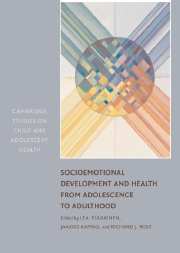Book contents
- Frontmatter
- Contents
- List of Contributors
- Preface
- Introduction
- PART I LONGITUDINAL AND BEHAVIORAL GENETIC APPROACHES
- PART II ADOLESCENT HEALTH-RELATED BEHAVIOR AND ADULT HEALTH
- PART III SOCIOEMOTIONAL BEHAVIOR IN EARLY ADOLESCENCE
- PART IV LIFE COURSE AND HEALTH
- Summary and Future Directions
- References
- Author Index
- Subject Index
PART IV - LIFE COURSE AND HEALTH
Published online by Cambridge University Press: 07 December 2009
- Frontmatter
- Contents
- List of Contributors
- Preface
- Introduction
- PART I LONGITUDINAL AND BEHAVIORAL GENETIC APPROACHES
- PART II ADOLESCENT HEALTH-RELATED BEHAVIOR AND ADULT HEALTH
- PART III SOCIOEMOTIONAL BEHAVIOR IN EARLY ADOLESCENCE
- PART IV LIFE COURSE AND HEALTH
- Summary and Future Directions
- References
- Author Index
- Subject Index
Summary
This section analyzes paths from an individual's developmental background factors to physical and psychological well-being in adulthood through identity formation, personal control over development, sense of coherence, optimism, education, work, and personality characteristics. These psychosocial factors, which explain psychological well-being in adulthood, are rooted in one's developmental background, that is, school success in early adolescence, child-centered parenting, the parents' occupational status, and one's emotion regulation. Adult physical well-being correlates with psychological well-being but is not directly accounted for by these psychosocial factors, with a few exceptions.
Chapter 13 by Fadjukoff and Pulkkinen analyzes adaptive capacities in terms of identity achievement and personal control over development. These capacities are relatively stable in adulthood. They contribute to adult psychological well-being, which correlates negatively with psychosomatic symptoms. School success in adolescence and the parents' occupational status are associated with identity achievement, which facilitates both social and psychological well-being. As compared to identity, personal control over development is more highly connected to the quality of the individual relationships within the family of origin, that is, child-centered parenting, and it is much more highly related to psychological well-being.
Chapter 14 by Feldt, Mäkikangas, and Aunola also addresses positive psychology, which is oriented to strengths and virtues rather than weaknesses and suffering, by exploring the constructs of sense of coherence and optimism. These highly related but not identical constructs have roots in child-centered parenting; optimism also has roots in school success and life satisfaction.
- Type
- Chapter
- Information
- Publisher: Cambridge University PressPrint publication year: 2006

